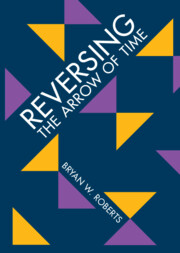
-
Select format
-
- Publisher:
- Cambridge University Press
- Publication date:
- November 2022
- December 2022
- ISBN:
- 9781009122139
- 9781009123327
- Creative Commons:
-
This content is Open Access and distributed under the terms of the Creative Commons Attribution licence CC-BY-NC-ND 4.0.
https://creativecommons.org/creativelicenses - Dimensions:
- (244 x 170 mm)
- Weight & Pages:
- 0.63kg, 264 Pages
- Dimensions:
- Weight & Pages:
Open AccessYou have access to this book
Book description
The arrow of time refers to the curious asymmetry that distinguishes the future from the past. Reversing the Arrow of Time argues that there is an intimate link between the symmetries of 'time itself' and time reversal symmetry in physical theories, which has wide-ranging implications for both physics and its philosophy. This link helps to clarify how we can learn about the symmetries of our world; how to understand the relationship between symmetries and what is real, and how to overcome pervasive illusions about the direction of time. Roberts explains the significance of time reversal in a way that intertwines physics and philosophy, to establish what the arrow of time means and how we can come to know it. This book is both mathematically and philosophically rigorous yet remains accessible to advanced undergraduates in physics and philosophy of physics. This title is also available as Open Access on Cambridge Core.
Reviews
‘… the book is complementary to many discussions about (real or imagined) arrows of time in physics, and is clearly written despite the philosophical and mathematical details. [… this book] is thus essential reading for those interested, whether or not they completely agree with Roberts.’
Phillip Helbig Source: The Observatory
‘[T]his book mines the rich but underexploited seam of natural philosophical ideas that deepen our understanding of the structure of physical theory in a manner valuable to philosophers and physicists alike. Much of the book is highly formal, but the philosophical and scientific value of what is done are difficult to overstate.’
Karim P. Y. Thébault Source: Metascience
Contents
Full book PDF-
Frontmatter
pp i-iv -
-
- You have access
- Open access
- Export citation
-
-
Contents
pp v-vi -
-
- You have access
- Open access
- Export citation
-
-
What Is in This Book
pp vii-ix -
-
- You have access
- Open access
- Export citation
-
-
Acknowledgements
pp x-xii -
-
- You have access
- Open access
- Export citation
-
-
1 - A Brief History of Time Reversal
pp 1-20 -
-
- You have access
- Open access
- Export citation
-
-
2 - What Time Reversal Means
pp 21-49 -
-
- You have access
- Open access
- Export citation
-
-
3 - Time Reversal in Physical Theory
pp 50-83 -
-
- You have access
- Open access
- Export citation
-
-
4 - Philosophy of Symmetry
pp 84-114 -
-
- You have access
- Open access
- Export citation
-
-
5 - Arrows That Misfire
pp 115-138 -
-
- You have access
- Open access
- Export citation
-
-
6 - There Is No Thermodynamic Arrow
pp 139-167 -
-
- You have access
- Open access
- Export citation
-
-
7 - Time Reversal Violation
pp 168-191 -
-
- You have access
- Open access
- Export citation
-
-
8 - Representing CPT
pp 192-218 -
-
- You have access
- Open access
- Export citation
-
-
Epilogue
pp 219-220 -
-
- You have access
- Open access
- Export citation
-
-
Bibliography
pp 221-248 -
-
- You have access
- Open access
- Export citation
-
-
Index
pp 249-252 -
-
- You have access
- Open access
- Export citation
-
Metrics
Altmetric attention score
Full text views
Full text views help Loading metrics...
Loading metrics...
* Views captured on Cambridge Core between #date#. This data will be updated every 24 hours.
Usage data cannot currently be displayed.
Accessibility standard: Unknown
Why this information is here
This section outlines the accessibility features of this content - including support for screen readers, full keyboard navigation and high-contrast display options. This may not be relevant for you.
Accessibility Information
Accessibility compliance for the PDF of this book is currently unknown and may be updated in the future.


